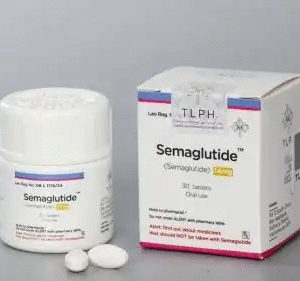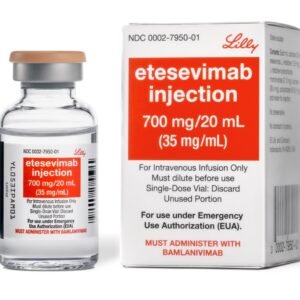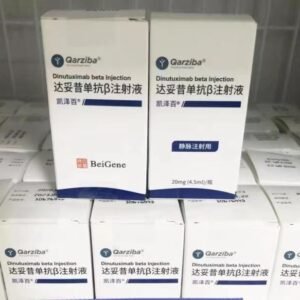Nintedanib esilate soft capsules.
Effects and efficacy: Nintedanib is approved in China for the treatment of idiopathic pulmonary fibrosis (IPF). IPF is an interstitial pneumonia of unknown cause that occurs in adults, is limited to the lungs, and is chronic and progressive, causing fibrosis. In addition, Nintedanib can also be used to treat systemic sclerosis-related interstitial lung disease (SSc-ILD) and chronic fibrotic interstitial lung disease with a progressive phenotype.
Dosage and administration: Nintedanib treatment should be initiated by a physician with experience in diagnosing and treating idiopathic pulmonary fibrosis. Recommended dose The recommended dose of this product is 150 mg each time, twice a day, with an interval of approximately 12 hours between doses. The maximum recommended daily dose is 300 mg. Depending on the degree of tolerance, the dose can be reduced to 100 mg, twice a day. Liver function should be checked regularly before the start of treatment and during administration. Once abnormal liver function occurs, the dose should be reduced or the drug should be discontinued. This product should be taken with food and the whole capsule should be taken with water. This product has a bitter taste and should not be chewed or crushed for administration. Dose adjustment If the patient can tolerate it, in addition to symptomatic treatment, the adverse reaction management of this product may include reducing the dose and temporarily interrupting the administration until the specific adverse reaction is relieved to a level that allows continued treatment. Treatment with this product can be restarted with the full dose (150 mg each time, twice a day) or a reduced dose (100 mg each time, twice a day). If the patient cannot tolerate 100 mg each time, twice a day, treatment with this product should be stopped. If elevated liver enzymes occur, the dose may need to be adjusted or treatment interrupted. Before treatment with this product, liver function tests should be performed regularly during the first 3 months of treatment, and periodically or according to clinical indications thereafter. Relevant indicators include aspartate aminotransferase (AST), alanine aminotransferase (ALT) and bilirubin. If the patient reports symptoms that may indicate liver damage, including fatigue, anorexia, discomfort in the right upper abdomen, yellow urine or jaundice, liver function should be tested immediately.
Adverse reactions: The most common adverse events of nintedanib include diarrhea, nausea and vomiting, abdominal pain, loss of appetite, weight loss and elevated liver enzymes. In addition, adverse reactions such as thrombocytopenia, bleeding, hypertension, pancreatitis, abnormal liver function, skin and subcutaneous tissue diseases, and nervous system diseases may also occur. Diarrhea Diarrhea is the most common gastrointestinal event, which is mild to moderate in severity in most patients and occurs within the first 3 months of treatment. Diarrhea led to a reduction in drug dose in 10.7% of patients and discontinuation of treatment in 4.4% of patients. Appropriate rehydration and antidiarrheal drugs, such as loperamide, should be used for treatment at the first onset of diarrhea, and treatment interruption may be required. Treatment with this product can be resumed at a reduced dose (100 mg each time, twice a day) or at the full dose (150 mg each time, twice a day). If severe diarrhea persists despite symptomatic treatment, treatment with this product should be discontinued. Nausea and vomiting Nausea and vomiting are commonly reported adverse events. In most patients with nausea and vomiting, the severity of the event was mild to moderate. Nausea led to discontinuation of nintedanib treatment in 2.0% of patients. Vomiting led to discontinuation of nintedanib treatment in 0.8% of patients. If symptoms persist despite appropriate supportive care (including antiemetic therapy), dose reduction or interruption of treatment may be necessary. Treatment may be resumed at a reduced dose (100 mg twice daily) or at the full dose (150 mg twice daily). If severe symptoms persist despite symptomatic treatment, treatment with nintedanib should be discontinued. Diarrhea and vomiting may lead to dehydration and/or electrolyte disturbances. Abnormal liver function Nintedanib administration may be associated with elevations in liver enzymes (ALT, AST, alkaline phosphatase (ALKP), gamma-glutamyltransferase (GGT)) and bilirubin. Elevations in aminotransferases and bilirubin are reversible with dose reduction or interruption of treatment. Liver function tests (ALT, AST, and bilirubin) should be performed before treatment with nintedanib, monthly for 3 months, and every 3 months thereafter, or as clinically indicated. Elevated liver enzymes may require dose adjustment or interruption of treatment (. Patients weighing less than 65 kg, Asians, and women are at higher risk of elevated liver enzymes. Nintedanib exposure increases linearly with patient age, which may also lead to an increased risk of elevated liver enzymes. Close monitoring of patients with the above risk factors is recommended. If an increase in aminotransferase (AST or ALT) is detected within 1.5 times the upper limit of normal (ULN) and there is no sign of moderate liver damage (Child Pugh B), it is recommended to reduce the dose or interrupt treatment with this product, and the patient should be closely monitored. Once aminotransferases return to baseline values, treatment with this product can be increased again to the full dose (150 mg each time, twice a day), or at a reduced dose (100 mg twice daily) and may subsequently be increased to the full dose. If any elevation in liver function tests is accompanied by clinical signs or symptoms of liver injury, such as jaundice, treatment with this drug should be permanently discontinued. Other possible causes of elevated liver enzymes should be sought. Bleeding Inhibition of vascular endothelial growth factor receptor (VEGFR) may be associated with an increased risk of bleeding. Non-serious and serious bleeding events, some of which were fatal, have been observed. Embryo-fetal toxicity This drug can cause harm to the fetus when administered to a pregnant woman and is contraindicated in pregnant women. Women of childbearing potential should not receive this drug. Pregnancy should be avoided during treatment with this product. Effective contraceptive measures should be taken during treatment with this product and for at least 3 months after the last dose. Check pregnancy status before taking this product. Hypertension This product may cause high blood pressure. Systemic blood pressure should be checked regularly and should also be tested when clinical manifestations occur. Allergic reactions This soft capsule contains soy lecithin. Patients who are allergic to soy may experience allergic reactions, including severe anaphylaxis, when consuming soy products. Patients who are allergic to peanut protein are also at increased risk of severe reactions to soy products.
Drug contraindications:
Allergic to this product is contraindicated during pregnancy
Share:
Products
Our offers
Health Classification
Let us work together to protect precious health



























